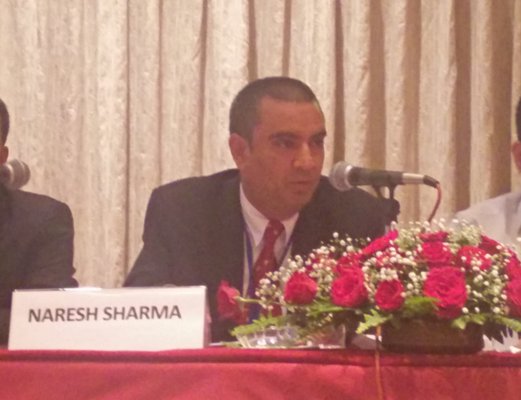
Delegates from Afghanistan, India, Nepal and Pakistan are meeting at a two-day dialogue in Kathmandu to discuss ways of planning for the future impacts of climate change in the South Asian region. This is the first time governments of the four countries are meeting after the Paris Agreement to share experiences with budgeting and financing approaches to support climate-resilient economic growth.
Considering vulnerabilities, representatives from the four countries will discuss how well South Asia is able to reduce climate vulnerability, build capacity to adapt to, and enhance resilience to climate change impacts.
Naresh Sharma, Chief, Climate Finance Management Section, Ministry of Population and Environment, Government of Nepal said, “We share common concerns and have a common interest to prepare for climate change impacts. Climate change will cumulatively affect economic growth in South Asia; therefore, we need to prepare our poor and climate vulnerable populations to build their adaptive capacity and reduce vulnerability”.
Syed Rizwan Mehboob, the Pakistan Prime Minister's adviser on climate change looked forward “to sharing Pakistan’s experience of raising finance from international climate funds, and learning from the experience of those here”. He added, “Pakistan Government has already allocated Rs 2 Billion for launching the Green Pakistan Program from its own sources and is now actively pursuing the Green Climate Fund and other CSR resources to augment this program for a resilient Pakistan."
The head of the DFID office in Nepal, Gail Marzetti, said “It is good to see the leadership of the Government of Nepal in agreeing to host this regional dialogue in Nepal – where we are already seeing climate impacts. For example, over 150,000 people in the Karnali region of Nepal were affected by a drought this year. For the first time Governments of Afghanistan, India, Nepal and Pakistan are meeting to discuss Climate Change issues and how finance approaches can reduce the impacts of climate change.”
The discussion will range from financing climate change in South Asia, mobilising private finance to planning and budgeting at the sub-national level.
The dialogue will be followed by launching Climate Change Financing Frameworks report which reviews work related to CC Financing Frameworks (CCFFs) in Afghanistan, Nepal, Pakistan and six Indian States.
Other eminent dignitaries at the dialogue who will share insights include Kenici Yokoyama (Country Director Nepal, Asian Development Bank), Youssef Nassef (Coordinator, Adaptation Program, UNFCCC Secretariat) and Dr. B. G. Mukhopadhyay (Chief General Manager, National Bank for Agricultural and Rural Development, India).
South Asia is particularly vulnerable to climate change which can result in higher average temperatures, changes in rainfall and more extreme weather events like major storms. These changes are going to have a range of knock on effects in the region including glacial melting in the Himalayas which currently feed water to a billion people, a decrease in crop yields by up to 30% by 2050 and increased storms and flooding that can increase incidence of diseases such as diarrhea, malaria and dengue fever. It is estimated that GDP growth rates in the region will decrease by 3-5% by 2050 as a result of cumulative impacts of climate change. The question is then, how well will South Asia be able to cope with the climate change impacts it faces?
The Regional Dialogue on Financing Climate Resilient Growth in South Asia is being organized by the Ministry of Population and Environment, Government of Nepal, the UK Department for International Development and Action on Climate Today (ACT), on 26 and 27 September 2016 in Kathmandu. The Dialogue brings together senior representatives from ministries of finance, planning, environment and climate change, as well as local government bodies from Afghanistan, India, Nepal and Pakistan. Key development partners from civil society and UN agencies such as the United Nations Development Program are contributing to discussions.
ACT, which is funded by the UK Department for International Development (DFID) is a regional program working with governments to plan and budget for future climate change impacts that threaten to slow the growth of national economies.
- TANAHU HYDROPOWER PROEJCT: A Significant Achievement
- Apr 15, 2024
- AMBASSADOR HANAN GODAR: Sharing Pain With A Nepali Family
- Mar 30, 2024
- VISIT OF KfW AND EIB TO NEPAL : Mission Matters
- Mar 25, 2024
- NEPAL BRITAIN SOCIETY: Pratima Pande's Leadership
- Mar 24, 2024
- NEPAL ARMY DAY: Time To Recall Glory
- Mar 15, 2024
















